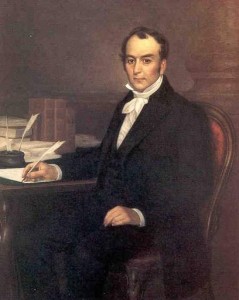Bloody Bloody Louis McLane
In which I bring together two of my favorite topics, local history and local theater
I saw a fun production of Bloody Bloody Andrew Jackson this past weekend at Wilmington’s City Theater Company. I’d recommend catching it if you can take a break from finals. It has everything: rock and roll, men in tight pants, dancing, fake blood, obscenities, and the entertaining but historically and politically incorrect story of Andrew Jackson.
There’s only one thing missing from this fine production and that is Delaware’s own member of Jackson’s cabinet, Louis McLane! He was left out of the play, probably “in the interest of narrative economy” as the play says. Also probably because he really wasn’t very funny.
Louis McLane was born in 1784 in Delaware. His father, Allen McLane, was a Revolutionary War hero and Collector of the Customs for the District of Delaware, which basically means he was chief tax collector at the port of Wilmington. Wilmington was a major port at the time so he made good money. At 15 Louis became a Navy midshipman and went to sea, but after one voyage he resigned, possibly because he was terribly seasick.
After he left the Navy, Louis went to school at the Newark Academy and then read law with James A. Bayard. While studying to be a lawyer he fought a duel with a fellow law clerk and was shot in the groin. He later had 13 children so it couldn’t have been too serious. He volunteered for an Artillery Company during the War of 1812 but never saw any action.

Louis McLane lived in this house at 606 Market St in Wilmington. It has been remodeled so many times there is probably little left of the original house.
McLane started a law practice and went into politics. He was elected to the US House of Representatives in 1817, where he served for 10 years and became Chairman of the influential House Ways and Means Committee. He left the House when he was elected to the Senate in 1827.
McLane belonged to the Federalist Party, one of the original political parties which had pretty much died out in the rest of the country but was still popular in Delaware, which has always been a bit slow to change. McLane became a friend of Martin Van Buren and admirer of Andrew Jackson and led his wing of the Delaware Federalists into Jackson’s party. In return for his support McLane hoped for a cabinet position or to be named to the Supreme Court. He was disappointed however to be made Minister Plenipotentiary to Great Britain. This may sound like a great position but it didn’t pay all that well and involved a lot of expense as he had to bring his whole family over to Britain in a boat and they still didn’t have steamships so it wasn’t a fun crossing. Then you had to live in London, one of the world’s most expensive cities and entertain lavishly, so it wasn’t a profitable job.
Luckily for McLane, Andrew Jackson got mad at his entire cabinet because their wives were rude to somebody and decided to replace them. McLane was made Secretary of the Treasury which would have been great, except for one big problem. The Bank of the United States. I have never understood the whole Bank of the United States thing, but the important point is that Andrew Jackson was against the Bank of the United States and McLane was for it. McLane refused to withdraw the federal treasury money from the Bank so Jackson replaced him and made him Secretary of State instead. McLane didn’t have much better luck as Secretary of State. He was trying to resolve the French Spoliation claims (which involved the French owing us money and not paying it back) when Martin Van Buren, Jackson’s Vice President and McLane’s old friend, went behind his back and solved the problem himself. McLane was so mad he resigned from the Cabinet and never spoke to Van Buren again.
McLane retired from politics, left Delaware and moved to Baltimore where he became president of the Morris Canal & Banking Company and later the Baltimore and Ohio Railroad. He made a further brief foray into national politics when he was named Minister Plenipotentiary to Great Britain again by James K. Polk. But he never got to be a Supreme Court Justice. Louis McLane died in Baltimore in 1857. From what I’ve read about McLane it’s hard to tell whether he would have been relieved to not be portrayed as a prancing aristocrat in Bloody Bloody Andrew Jackson or angry that he was left out. One way or the other he probably would have challenged somebody to a duel.
Photo credits: Wikimedia Commons http://commons.wikimedia.org/wiki/File:LMcLane.jpg and http://commons.wikimedia.org/wiki/File:606_Market_Wilm_DE.jpg
A much less silly and more scholarly version of Louis McLane’s life can be found in: John A. Munroe. Louis McLane: Federalist and Jacksonian. Rutgers University Press, 1973.
